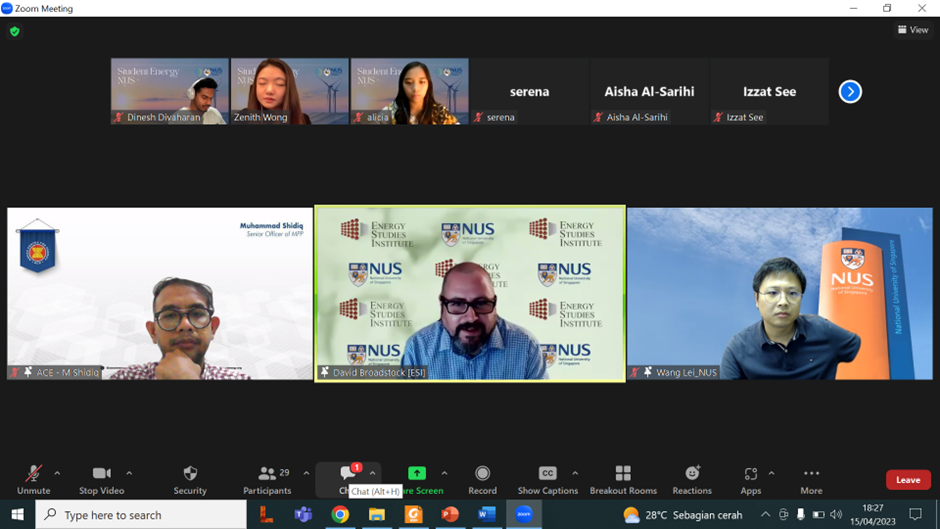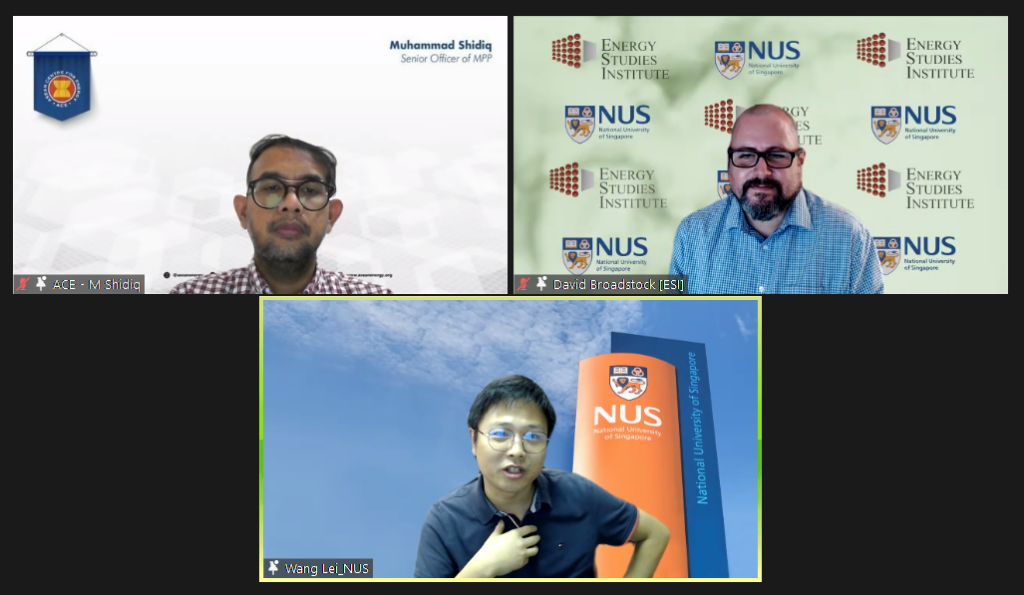Menu
A webinar on empowering hydrogen development to achieve ASEAN’s net zero target has been successfully organised by ASEAN Climate Change and Energy Project (ACCEPT II) of ASEAN Centre for Energy (ACE) and the National University of Singapore (NUS) through the Zoom platform on Saturday, 15 April 2023 at 7.30 PM – 8.30 PM Singapore time. The event was attended by more than 40 participants to update on the hydrogen situation and development in the ASEAN region.

Figure 1. The speakers, organiser and participants during the ASEAN hydrogen webinar
ACCEPT II Senior Researcher Muhammad Shidiq presented the ACE and ACCEPT II project, explaining that the ACCEPT project promotes and supports information sharing on the energy-climate nexus in the region. The project also aims to support the ASEAN Member States (AMS) and ASEAN’s capacity to transition to a low-carbon energy system and contribute to carbon neutrality or a net zero future.
His presentation was followed by delivering detailed progress on hydrogen deployment in the ASEAN region by highlighting ACE’s hydrogen study, namely Hydrogen in ASEAN: Economic prospects, development and applications. It highlighted the findings, including hydrogen for power storage, hydrogen for transportation, and hydrogen for export market.
He also mentioned that there is a potential for ASEAN to build a hydrogen environment from grey, blue and green hydrogen. However, there are challenges, for instance, the cost of hydrogen for power storage is higher if compared to other energy storage. On average, hydrogen plus fuel cell will cost around $1.47/kWh and $0.51/kWh for hydrogen as gas turbine fuel, where Lithium battery cost $0.42/kWh and pump hydro $0.32/kWh. The condition is also supported by inadequate technology for utility-scale fuel cell and a 100% hydrogen gas turbine. In the regional context, it was noted that Singapore is the only AMS that put their clear and optimistic target of hydrogen energy development through Singapore’s National Hydrogen Strategy.

Figure 2.The three speakers, Muhammad Shidiq (top left), Dr David Broadstock (top right) and Dr Lei Wang (below) during the discussion to respond to participants’ questions
Using an FGD concept, the webinar consists of several entertaining questions. In this opportunity, NUS Assistant Professor of Department of Chemical and Biomolecular Dr Lie Wang agreed that hydrogen could be produced by renewable resources. In this case, Singapore mostly utilises natural gas as a power source. To progressively move to hydrogen transition, the country needs to burn 1,000 pounds of hydrogen per day to replace the current power supply. In fact, it is not easy because hydrogen is still challenging to handle.
From the financial side, the production cost of hydrogen reaches S$10, meanwhile, the target is to reach S$1. Although producing hydrogen is not difficult, another challenge comes from the distribution process. A 20-truck-long vehicle is needed to transport 1 ton of hydrogen, which is inefficient as for now. In advance, it still lacks human powers for developing hydrogen-related technology.
On the other side, NUS Senior Research Fellow & Head of Energy Economics Divisions at Energy Studies Institute (ESI) Dr David Broadstock discussed the total available market for hydrogen in ASEAN. He has been working on several energy economics project works and research of green finance. From his perspective, the hydrogen market in ASEAN is still infant and needs to develop and support the hydrogen supply chain, especially for the unattractive price. Note that, the Singapore government is willing to invest in the technology, and that is a promising step to push the market forward as an essential move. In this case, the Singapore government is still open for the tender process in the hydrogen sector.
Specifically, hydrogen storage in ASEAN is still very far from implementation. It is predicted that the hydrogen price will decrease gradually by the year. The countries are currently working on the research stage. Nonetheless, some of the ASEAN countries have begun to consider hydrogen development to achieve net zero target. The action must be supported by more scenario based on population density and prioritise the law and regulations before it comes to the commercialisation stage.
In conclusion, the speakers agreed that Singapore, along with the region, are not behind in hydrogen research and development and still working on the progress to keep on track with the recent hydrogen-related technology development.
Detailed information on ACCEPT II: https://accept.aseanenergy.org/.
For any collaborations with ACCEPT II: [email protected]
